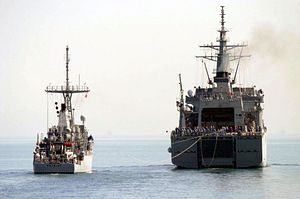During a plenary session of the House of Representatives on Monday, Japanese Prime Minister Shinzo Abe affirmed that engaging in minesweeping operations in the Strait of Hormuz – if the straits were to be blockaded using undersea mines – would be a positive case of Japan using its Self-Defense Forces (SDF) abroad under the principle of collective self-defense. Such a hypothetical blockade “could be considered a situation that clearly causes as serious and significant damage as a direct armed attack on Japan. … [The impact of a blockade] would be far greater than those of the past oil crises and the world economy would be thrown into total disarray,” Abe warned.
Defense Minister Gen Nakatani supported Abe’s answers, explaining, “If mines are laid in the strait, it will halt oil supply, which will have a significant impact on the daily lives of Japanese citizens. As a result, the country’s existence will be threatened.” Abe and Nakatani are arguing that such a blockade would meet the criteria established last July for the right to exercise collective self-defense. The Cabinet decision to reinterpret Article 9 of Japan’s constitution stated that Japan can deploy the SDF overseas for collective self-defense purposes “when an armed attack against a foreign country that is in a close relationship with Japan occurs and as a result threatens Japan’s survival and poses a clear danger to fundamentally overturn people’s right to life, liberty, and the pursuit of happiness.” In a hypothetical Strait of Hormuz crisis, Japan’s right to collective self-defense could also be invoked if there was a “clear danger” that force would be used against a U.S. warship carrying Japanese troops.
These high-profile comments are yet another attempt by the ruling Liberal Democratic Party (LDP) to dispel the Komeito’s concerns about conducting minesweeping operations under the framework of collective self-defense. Komeito, LDP’s junior coalition partner, wants to avoid foreign entanglements far from the archipelago. Furthermore, Komeito worries that conducting minesweeping operations before warring parties reach an official ceasefire accord constitutes a “use of force” under international law. SDF minesweeping operations in the Persian Gulf in 1991 after the 1990-91 Gulf War did not count as the “use of force” since the operations came after a cease-fire was in place.
Komeito remains skeptical of Abe’s argument. Last December, Komeito leader Natsuo Yamaguchi asked: “I wonder if laying mines would immediately lead to an economic panic?” The issue of minesweeping operations in the Strait of Hormuz had been raised as early as last July. At the time LDP and Komeito had agreed to put off the issue. In response to Abe’s most recent remarks, a senior Komeito member expressed “surprise” that Abe “went so far as to say that.”
Although politically controversial, allowing SDF minesweeping operations – should such a “gray zone” scenario arise – would be healthy for U.S.-Japan relations. Japan’s minesweeping capabilities are world-class, and the U.S. would rightly expect the Maritime SDF to be involved in such an international crisis. A clear legal framework to answer such expectations would help avoid confusion and disappointment when the time comes for Japan to test its mettle as a “proactive pacifist” country.
The question of hypothetical minesweeping duties in the Hormuz Strait is just one part of a larger argument over how exactly to define collective self-defense. Another point of ongoing debate between the LDP and Komeito is whether SDF protection could be extended not only to American weapons and ships, but also to those of other nations such as Australia. Komeito accused the LDP of stretching the legislation “beyond the scope” of the Cabinet decision, which specifically mentions only protection for the U.S. military.

































